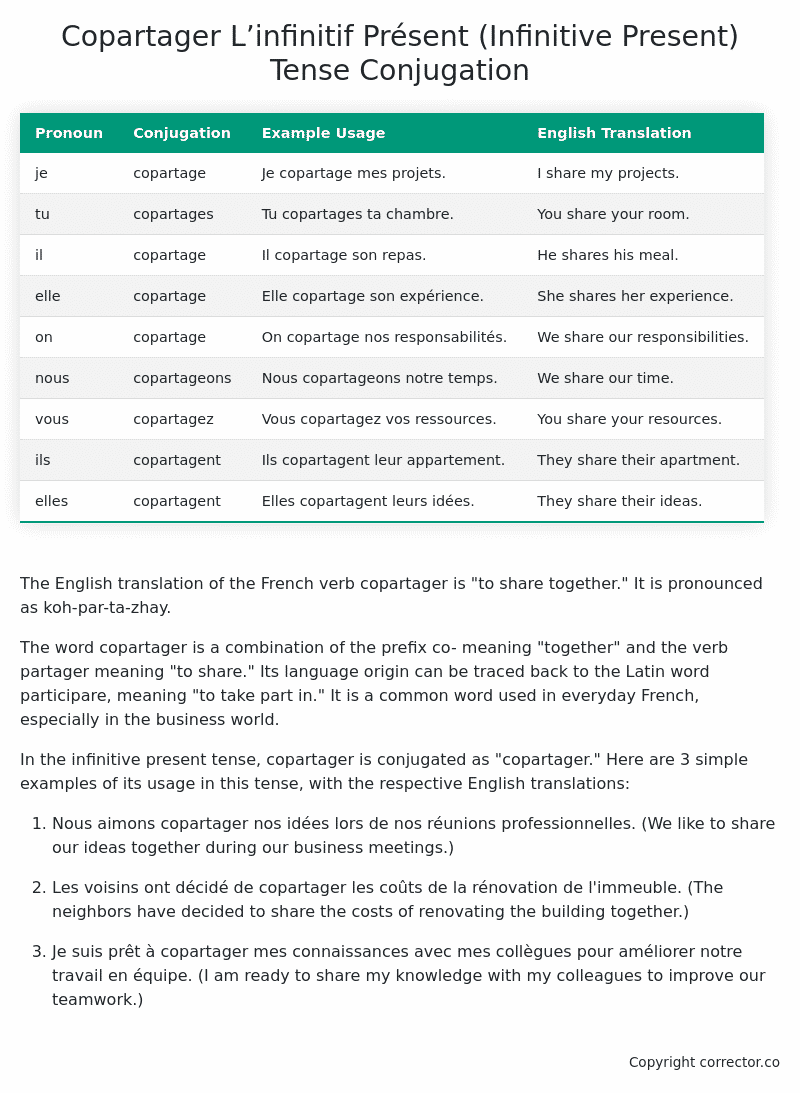L’infinitif Présent (Infinitive Present) Tense Conjugation of the French Verb copartager
Introduction to the verb copartager
The English translation of the French verb copartager is “to share together.” It is pronounced as koh-par-ta-zhay.
The word copartager is a combination of the prefix co- meaning “together” and the verb partager meaning “to share.” Its language origin can be traced back to the Latin word participare, meaning “to take part in.” It is a common word used in everyday French, especially in the business world.
In the infinitive present tense, copartager is conjugated as “copartager.” Here are 3 simple examples of its usage in this tense, with the respective English translations:
-
Nous aimons copartager nos idées lors de nos réunions professionnelles. (We like to share our ideas together during our business meetings.)
-
Les voisins ont décidé de copartager les coûts de la rénovation de l’immeuble. (The neighbors have decided to share the costs of renovating the building together.)
-
Je suis prêt à copartager mes connaissances avec mes collègues pour améliorer notre travail en équipe. (I am ready to share my knowledge with my colleagues to improve our teamwork.)
Table of the L’infinitif Présent (Infinitive Present) Tense Conjugation of copartager
| Pronoun | Conjugation | Example Usage | English Translation |
|---|---|---|---|
| je | copartage | Je copartage mes projets. | I share my projects. |
| tu | copartages | Tu copartages ta chambre. | You share your room. |
| il | copartage | Il copartage son repas. | He shares his meal. |
| elle | copartage | Elle copartage son expérience. | She shares her experience. |
| on | copartage | On copartage nos responsabilités. | We share our responsibilities. |
| nous | copartageons | Nous copartageons notre temps. | We share our time. |
| vous | copartagez | Vous copartagez vos ressources. | You share your resources. |
| ils | copartagent | Ils copartagent leur appartement. | They share their apartment. |
| elles | copartagent | Elles copartagent leurs idées. | They share their ideas. |
Other Conjugations for Copartager.
Le Present (Present Tense) Conjugation of the French Verb copartager
Imparfait (Imperfect) Tense Conjugation of the French Verb copartager
Passé Simple (Simple Past) Tense Conjugation of the French Verb copartager
Passé Composé (Present Perfect) Tense Conjugation of the French Verb copartager
Futur Simple (Simple Future) Tense Conjugation of the French Verb copartager
Futur Proche (Near Future) Tense Conjugation of the French Verb copartager
Plus-que-parfait (Pluperfect) Tense Conjugation of the French Verb copartager
Passé Antérieur (Past Anterior) Tense Conjugation of the French Verb copartager
Futur Antérieur (Future Anterior) Tense Conjugation of the French Verb copartager
Subjonctif Présent (Subjunctive Present) Tense Conjugation of the French Verb copartager
Subjonctif Passé (Subjunctive Past) Tense Conjugation of the French Verb copartager
Subjonctif Imparfait (Subjunctive Imperfect) Tense Conjugation of the French Verb copartager
Subjonctif Plus-que-parfait (Subjunctive Pluperfect) Tense Conjugation of the French Verb copartager
Conditionnel Présent (Conditional Present) Tense Conjugation of the French Verb copartager
Conditionnel Passé (Conditional Past) Tense Conjugation of the French Verb copartager
L’impératif Présent (Imperative Present) Tense Conjugation of the French Verb copartager
L’infinitif Présent (Infinitive Present) Tense Conjugation of the French Verb copartager (this article)
Struggling with French verbs or the language in general? Why not use our free French Grammar Checker – no registration required!
Get a FREE Download Study Sheet of this Conjugation 🔥
Simply right click the image below, click “save image” and get your free reference for the copartager L’infinitif Présent tense conjugation!

Copartager – About the French L’infinitif Présent (Infinitive Present) Tense
Forming the Infinitive Present
Common Everyday Usage Patterns
As a Verb’s Dictionary Form
After Modal Verbs
As an Imperative
In Infinitive Clauses
Interactions with Other Tenses
Present Tense
Future Tense
Conditional Tense
Passé Composé
Imperfect Tense
Subjunctive and Conditional Moods
Summary
Want More?
I hope you enjoyed this article on the verb copartager. Still in a learning mood? Check out another TOTALLY random French verb conjugation!


